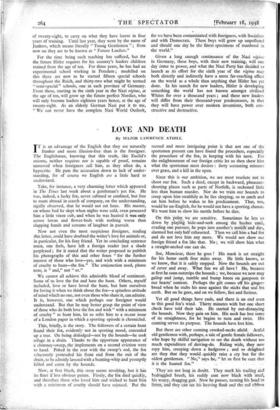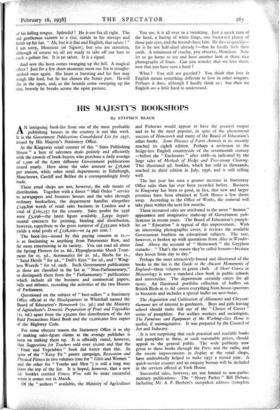LOVE AND DEATH
By MAJOR LAWRENCE ATHILL
IT is an advantage of the English that they are naturally franker and more illusion-free than is the foreigner. The Englishman, knowing that this truth, like Euclid's axioms, neither requires nor is capable of proof, remains unmoved when foreigners call him, as they often do, a hypocrite. He puts the accusation down to lack of under- standing, for of course we English are a little hard to understand.
Take, for instance, a very charming letter which appeared in The Times last week about a gentleman's pet fox. He was, indeed, a lucky fox, never cabined or confined, but free to roam abroad in search of company, on the understanding, rigidly observed, that he would not eat hens. His master, on whose bed he slept when nights were cold, even procured him_ a little vixen cub,-and when he was hunted it wasbcuily across lawns and flower-beds with nothing worse than clapping hands and screams of laughter in pursuit.
Now not even the most suspicious foreigner, reading this letter, could have doubted the writer's love for animals or, in particular, for his foxy friend. Yet its concluding sentence 'must, one feels, have left a foreign reader just a shade perplexed ; for it stated that the writer proposed to publish his photographs of this and other foxes "for the further interest of those who love—yes, and wish with a minimum of cruelty to hunt—the fox." The conjunction used, please note, is " and," not "or."
We cannot all achieve this admirable blend of sentiment. Some of us love the fox and hate the hunt. Others, myself included, love or have loved the hunt, but hate ourselves for loving it when we think about the fox—a spineless attitude of mind which no one, not even those who share it, can admire. It is, however, one which perhaps our foreigner would understand. But that he may better grasp the point of view of those who do both love the fox and wish" with a minimum of cruelty" to hunt him, let us refer him to a recent issue of a London paper in which a sporting episode is chronicled.
This, briefly, is the story. The followers of a certain hunt found their fox, evidently not in sporting mood, concealed up a tree. On being dislodged—not by the hounds—he took refuge in a drain. Thanks to the opportune appearance of a chimney-sweep, the implements on a second eviction were to hand. Poked in the rear with the sweep's rod, the fox reluctantly protruded his front end from the exit of the drain, to be adroitly lassoed with a hunting-whip and promptly killed and eaten by the hounds.
Now, at first blush, this story seems revolting, but it his its finer if less obvious points. Firstly, the fox died quickly, and therefore those who loved him and Wished to hunt him ' with a minimum of cruelty should have rejoiced. But the second and more intriguing point is that not one of the sportsmen present can have found the procedure, especially the procedure of the fox, in keeping with his taste, For the enlightenment of our foreign critic let us then show him what the sportsman most desires : forty screaming minutes over grass, and a kill in the open.
Since this is our ambition, we are most resolute not to shoot our fox. Such a deed, except in backward, pheasant- shooting places such as parts of Norfolk, is reckoned little less than human murder. Nor do we train our hounds to creep upon him stealthily as he lies sleeping, so to catch and eat him before he wakes to his predicament. That, too, would be un-English, for he would not have a sporting chance, We want him to show his mettle before he dies. - On this Milt "tve are sensitive. Sometimes he lets us down by -pla0n1 hide-and-seek among the bushes until, evading one pursuer, he pops into another's mat' and dies, alarmed but Only half exhausted. Then we Call him a bad fox and do not love him any more. We would- not show our foreign friend a fox like that. No; we will show him what a straight-necked one can do.
See, Monsieur, there he goes ! His mask is set straight for his home earth four miles away. He little knows, as we know, that it is safely stopped. Now the hounds are out of cover and away. What fun we all have! He, because at first he soon outstrips the hounds ; we, because we now may gallop and jump, tumble and bump knees on gateposts to our hearts' content Perhaps the gilt comes off his gingen:. bread when he stubs his nose against the sticks that seal his earth. But on he goes, and on we follow, fast and furious.
Yet all good things have ends, and there is an end even to this good fox's wind. Thirty minutes with but one short check have told their tale. He -started by out-distancing the hounds. Now they gain on him. His neck has lost iome of its straightness, for he begins to turn and twist. His cunning serves its purpose. The hounds have lost him.
But there are other cunning crooked-necks afield: ' Artful old gentlemen with, -perhaps-, a tale of gentle female followers, who hope by skilful navigation to see the death without too much expenditure of ,derring-do. Riding wide, they now espy him, creeping- down a hedgerow ; and so delighted are they that they would ,quickly raise a cry but for the oldest gentleman. ." No," says he, " let us first be sure that it is the hunted fox." - - _ They are not long in doubt. They mark his trailing and bedraggled brush; his ruddy coat -noW black with !mid, his weary, dragging gait Now he pauses, turning his head to listen, and- they- can' See his heaving flank and the red ribbon of his lolling tongue. Splendid ! He is our fox all right. The old gentleman canters to a rise, stands in his stirrups and holds up his hat. " Ah, but it is fine and English, that salute ! " I am sorry, Monsieur (or Signor), but you are mistaken, although of course we all are ready to take off our hats to such a gallant fox. It is no salute. It is a signal.
And now the horn comes twanging up the hill. A magical effect ! just for a few short moments more our fox is straight- necked once again. His heart is bursting and his feet may weigh like lead, but he has chosen the better part. He will die in the open, and, as the hounds come sweeping up the rise, bravely he breaks across the open pasture. You see, it is all over in a twinkling. Just a quick turn of the head, a baring, of white fangs, one backward glance of those pale eyes, and the hounds have him. He dies so quickly— for is he not half-dead already ?—that he hardly feels their teeth. A minimum of cruelty, you observe, Monsieur. Now let us go home to tea and have another look at those nice photographs of foxes. Can you wonder that we love them, now that you have seen a hunt ?
What ? You still are puzzled ? You think that love in English means something different to love in other tongues. Perhaps it does, although I hardly think so ; but then we English are a little hard to understand.











































 Previous page
Previous page